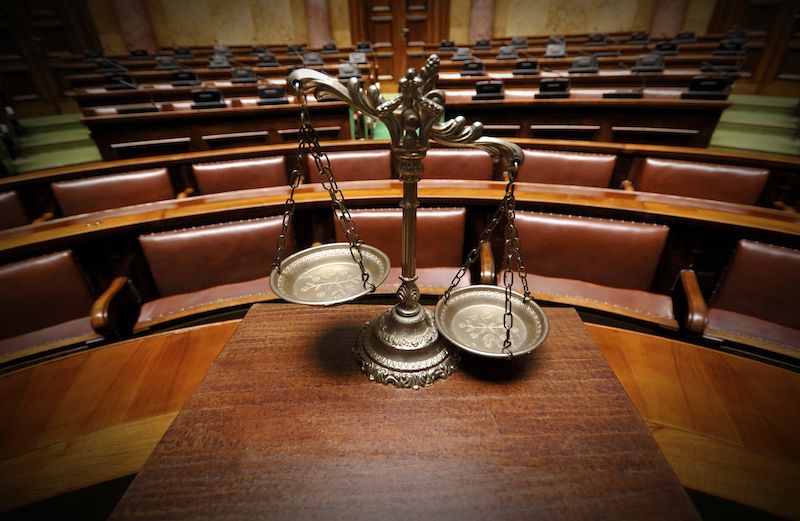I am sitting in a fluorescent-lit, windowless room with about 30 other people, trying to get my laptop to reconnect to Wi-Fi, again, while a guy dozes in the chair next to mine.
At the front of the room, a middle-aged goateed man with a court-officer badge pinned to his gray suit jacket stands with a microphone, spinning a metal drum full of cards.
He stops the drum, reaches in, grabs a card. He reads it and calls out a name.
 “Adam Hunter.”
“Adam Hunter.”
I quickly fold my laptop and raise my hand. The man pulls another card from the drum, reads another name. To the side, four lawyers stand waiting, whispering amongst themselves, peering at those assembled, getting their first look at the jury pool that could potentially decide their case.
It is my first time on jury duty. I’m a bit nervous. Now is not a good time to miss work–we’ve got an issue to close, and we’re already short on time because of the holidays.
Then, of course, there’s my other concern–being given the huge responsibility of deciding somebody else’s fate. Studies have revealed that even those jurors who believe they’re fair-minded can hold onto hidden, unconscious biases.
Can I really determine guilt or innocence? Am I up for it? I’ve watched a lot of episodes of Law & Order.
“This is not like an episode of Law & Order,” the plaintiff’s lawyer says, shortly after the selected group is ushered into another windowless room.
He informs me that, as the first juror randomly chosen from the drum, I’m likely to be named by the judge as jury foreman. This strikes me as both exciting and terrifying.
Who doesn’t want to be chosen as a leader? At the same time, what if this is a mob case, and some wiseguy threatens to familiarize me with the fishes?
The lawyers introduce the case–which we’re not allowed to talk about, of course. “I need to warn you,” the plaintiff’s lawyer says, “this case could go on for three weeks… or more.”
Suddenly, I’m quite sure that I don’t want to be on this jury.
They begin asking questions. I answer honestly–as much as I’m tempted to make up any reason to let me go. After a while, the lawyers convene together in a separate room and then return. My card is handed back to me. I feel a bit relieved–I haven’t been chosen for this particular trial. A bit disappointed too–no jury foreman honors for me.
After hours of waiting around with no new juries being convened, the goateed man speaks into the microphone that all the remaining cases that day have been settled. Everyone who hasn’t been selected is free to go, and credited with having done their duty.
A woman next to me jumps up and cries out, “Thank the Lord, God is great!” I’m not sure what God had to do with it, but clearly, performing her civic duty would have been even a bigger imposition for her than it would have been for me.
That’s when I notice something someone left behind on the chair behind me: a Guideposts magazine. Not a familiar sight in New York City, and far from expected in a windowless room of the courthouse.
I take it as a sign. This time around, God didn’t want me deciding someone’s fate. He needed me back at work.
In six years I can be called to jury duty again. If chosen to serve, I’ll do my part to help the cause of justice. For now, I want to hear your jury duty stories–the ones you’re permitted to share, of course.
What’s it like to decide someone’s fate? Did you lean on your faith at any point in the process?
Or did divine intervention get you out of it…until next time?
Share a comment below or send your story to us!




